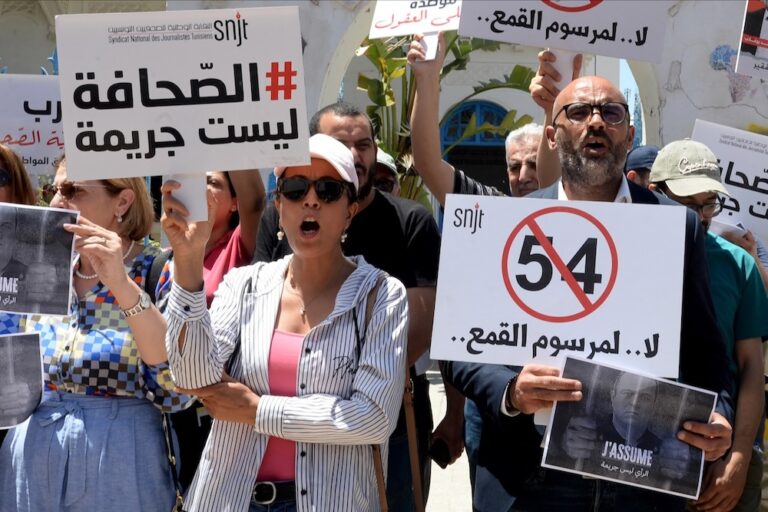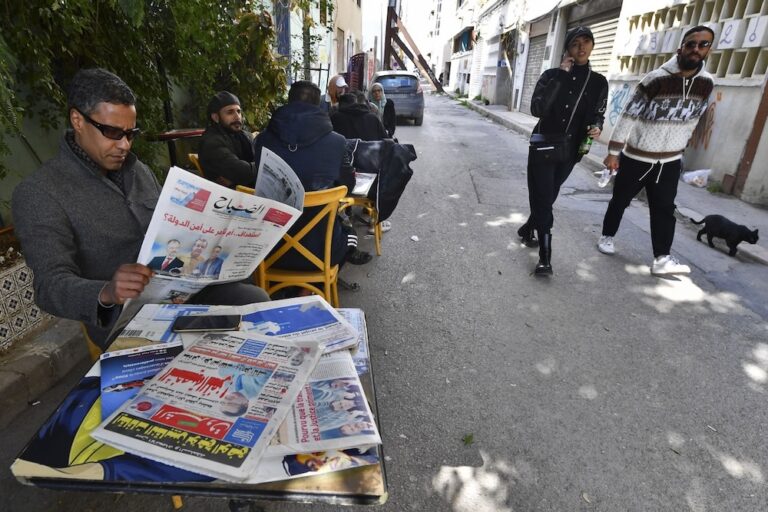Eighteen human rights organisations came together to support an open letter addressed by the Civil Coalition for the Defence of Freedom of Expression to the Chairman and members of the National Constituent Assembly in Tunisia, as they prepare to discuss the final draft of the constitution.
The 18 undersigned human rights organisations have come together in support of the open letter below addressed by the Civil Coalition for the Defence of Freedom of Expression on 4 June 2013 to the Chairman and members of the National Constituent Assembly in Tunisia, as they prepare to discuss the final draft of the constitution:
Mr Chairman of the National Constituent Assembly,
Honourable members of the National Constituent Assembly,
Greetings,
As the National Constituent Assembly prepares to discuss the final draft of the constitution, the Civil Coalition for the Defence of Freedom of Expression wishes to express its astonishment at the insistence to keep restrictions that threaten the media and freedom of expression, the most salient achievement of the revolution, in the text of the constitution.
The Coalition regrets the dismissal of the calls and recommendations by numerous Tunisian and international professional and human rights organisations concerning the adoption of a constitution guaranteeing basic rights and freedoms and free from restrictions that threaten the right of the Tunisian people to live in a democratic system, one of whose pillars is the freedom of the press. These calls and recommendations were echoed by the United Nations Human Rights Rapporteur and the African Union Special Rapporteur on Human and Peoples’ Rights at a press conference they held jointly in Tunis in October 2012.
The Coalition also regrets that both the preamble and the text of the draft constitution do not explicitly stipulate a commitment to protect freedom of expression pursuant to article 19 of the International Covenant on Civil and Political Rights ratified by the Tunisian state in March 1969.
That article stipulates: “Everyone shall have the right to freedom of expression; this right shall include freedom to seek, receive and impart information and ideas of all kinds, regardless of frontiers, either orally, in writing or in print, in the form of art, or through any other media of his choice.”
The exercise of the rights provided for in paragraph 2 of this article carries with it special duties and responsibilities. It may therefore be subject to certain restrictions, but these shall only be such as are provided by law and are necessary:
(a) For respect of the rights or reputations of others;
(b) For the protection of national security or of public order (ordre public), or of public health or morals.”
The Coalition thinks that adopting such a precise form as was ratified by Tunisia would help avoid including in the draft constitution an additional and vaguely formulated restriction on freedom of expression and reviving the restrictions provided in the 1959 constitution, which caused Tunisia to be listed among the states most hostile to freedom of the press and expression before the revolution. It should be noted that decrees 115 and 116 included the conditions of practising freedom of information and that article 1 of decree 115 provides greater protection of that right than the draft constitution.
The Coalition considers the setting up of an authority that seeks to “regulate and develop the information sector and guarantee freedom of the press and expression and the right of access to information”, an invention unparalleled in democratic regimes. Indeed, in democratic states the duty of regulating the print and electronic press specifically falls to representatives of journalists and media owners within the framework of regulatory authorities usually called “press councils”.
Trying to set up a regulatory body of dubious independence and neutrality, as its members are to be elected by representatives of political parties in the future Parliament, will pave the way for a regulatory body that would play the part of a watchdog stifling freedom of the press as was done before by the Ministry of Information, would prevail over the prerogatives of the High Independent Authority for Audio-visual Communication and would resume domination over all parts of the information sector.
For this reason, the Coalition demands the removal of article 124 of the draft constitution, which provides the setting up of that body, and the constitutionalisation of the High Independent Authority for Audio-visual Communication as is done in a number of democratic states.
The Coalition also demands expediting the removal of the vague expressions included in articles 30 and 31 of the draft constitution concerning the right of access to information and freedom of opinion and expression, which are only used in the constitutions of authoritarian regimes to put down freedom of expression and information.
Mr. Chairman of the National Constituent Assembly,
Honourable members of the National Constituent Assembly,
The Civil Coalition for the Defence of Freedom of Expression expresses the hope that you will rise to the occasion of your historic responsibility by adopting a constitution that will definitively turn the page of tyranny and help build democratic institutions that will guarantee Tunisia’s progress towards a better future.
Members of the Coalition:
The Tunisian Human Rights League
The National Syndicate of Tunisian Journalists
The General Culture and Information Union affiliated to the General Tunisian Labour Union
The Tunisian Union of the Independent and Party Press
The Tunisian Union of Free Radios
The Yaqadha Association for democracy and a civil state
The Tunis Centre for Press Freedom
Community Media Solutions
Free Press Unlimited
International Media Support
Media Legal Defence Initiative
Vivarta


